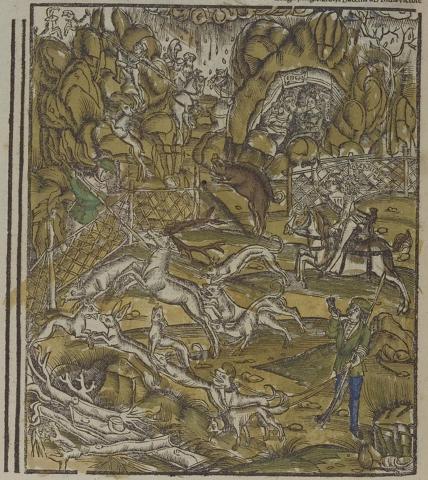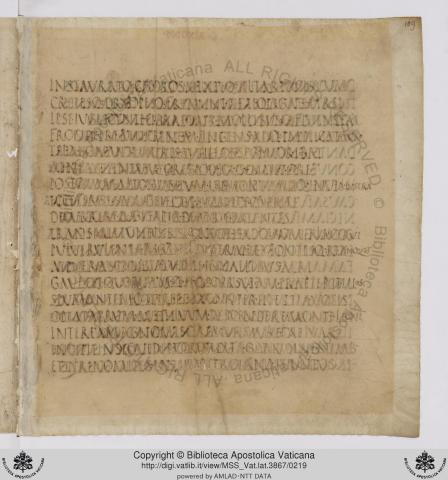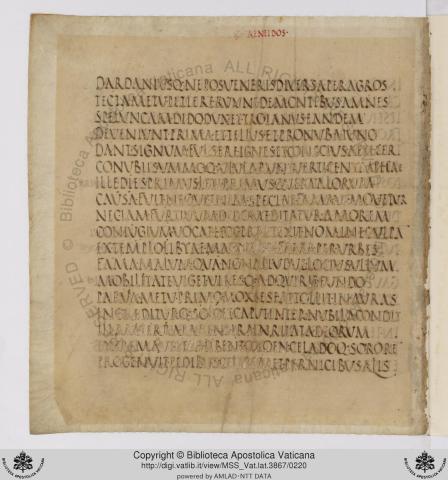Intereā magnō miscērī murmure caelum160
incipit, īnsequitur commixtā grandine nimbus,
et Tyriī comitēs passim et Trōiāna iuventūs
Dardaniusque nepōs Veneris dīversa per agrōs
tēcta metū petiēre; ruunt dē montibus amnēs.
Spēluncam Dīdō dux et Trōiānus eandem165
dēveniunt. Prīma et Tellūs et prōnuba Iūnō
dant signum; fulsēre ignēs et cōnscius aethēr
cōnubiīs summōque ululārunt vertice nymphae.
Ille diēs prīmus lētī prīmusque malōrum
causa fuit; neque enim speciē fāmāve movētur170
nec iam fūrtīvum Dīdō meditātur amōrem:
coniugium vocat, hōc praetēxit nōmine culpam.
notes
Manuscripts: M | P 162-172 | R 160-162, 163-172
160–72: A storm descends; Aeneas and Dido take refuge in a cave and, amid thunder and lightning, their fatal union is accomplished and Dido thenceforth openly proclaims Aeneas her lover (Page).
160: intereā: the word often introduces a peripeteia (Pease). magnō miscērī murmure: “to be troubled with mighty murmurings” (Page). A fine onomatopoeic line; Vergil makes an abrupt transition from the brilliant light of the previous passage to black darkness and impending misery (Austin). miscērī: a favorite word of Vergil’s to suggest confused irregular disorderly movement physical or mental (Stephenson). The sky is all a mass of noise (Austin).
161: incipit, insequitur: asyndeton and syllabic anaphora (F-B). īnsequitur commixtā grandine nimbus: Note the echo of 120 (nigrantem commixtā grandine nimbum) (Austin).
163: Dardanius nepōs Veneris: = Ascanius.
163–4: dīversa tēcta: “shelter here and there” (F-B).
164: petiēre: “eagerly seek” (Page). Perfect tense, syncopated form of petī(v)ērunt (F-B). amnēs: “torrents” instantly formed by the rain in hilly regions (Frieze). The dry river-beds are flooded in a moment (Austin).
165: spēluncam…: Repeated from 124. The fulfilment of Juno’s plan is related in the same words in which it is announced. What looks like a simple accident is thus strongly marked as the result of divine will, and the words acquire a certain ominous character which accords with what follows (Page). Note the contrast of Aeneas gallantly remaining with the queen when even her own attendants had scattered and left her (Pease). The hint of this passage is doubtless taken from Apollonius Rhodius 4.1130 ff., where the union of Jason and Medea is made to take place in a cave; but there is nothing in the description of the elder poet to remind us of Vergil, except the mention of Juno and of the Nymphs (Conington).
166 ff: The ceremonies of a Roman marriage are, as it were, imitated by the powers of nature. The flashes of lightning (ignēs) were the marriage-torches; the howling (ululārunt) of the nymphs in the tree-tops (summō vertice), the roaring of the wind stood for the festal cries and the hymeneal song, while the word chosen suggests an evil omen. Tellus and Juno, deities of earth and sky, attended, apparently, as aspicēs nuptiārum. These were persons whose duty it was, originally, to take the auspices at a wedding, but who, in historical times, had merely a ceremonial function, repeating, doubtless, some set form of words, though no omens were actually taken. In this capacity Tellus and Juno dant signum, i.e., for the marriage to proceed. To the names of these two deities are added the ceremonies belonging to each—the flashes in the air, and the effects of the storm on the earth (ululārunt, etc.), in chiastic order. The sky is a “witness” (conscius) of the wedlock (G-K).
166: prīma Tellūs: “primal Earth”; so called, as the oldest of the gods (F-B). Earth as the primal mother and Heaven (Aethēr) as the universal father descending into her lap in fertilizing showers (Page). prīma: for prīmum. Others translate as “ancient, earliest.” What the signal (signum) is, the poet does not say. Tellus and Juno both foster marriage rites (Frieze). prōnuba Iūnō: “nuptial Juno” (F-B). The prōnuba was a matron who had only been married to one husband, and her function was to conduct the bride to the lectus geniālis (“marriage bed”). It should be added that according to Varro prōnuba was one of the titles of Juno (Frieze).
167: dant signum: as if for the bridal procession (Austin). For the marriage ceremonies to begin. (F-B). fulsēre ignēs: the lightning flashes take the place of the usual “nuptial torches” with which the bride was conducted home (Page).
167–68: conscius aethēr conubiīs: “witness to the nuptials”; referring both to the lightning and the air. Conubiīs is dative with the adjective conscius (Frieze).
168: ululārunt Nymphae: perfect indicative, syncopated form of ululā(vē)runt. The shriek of the Nymphs is the bridal hymn (hymenaeus) (Page). Vergil also uses ululare for the howling of dogs (6.257) and wolves (7.18), of feminine wailing (2.487–488), and of ritual cries in the cult of Hecate (4.609). Most of these cases suggest either the sad or the uncanny. (Pease).
169-70: ille diēs prīmus lētī prīmusque malōrum causa fuit: “that day in the beginning was the cause of death, that day in the beginning was the cause of sorrow.” Prīmus is adverbial, repeated for special emphasis; Vergil makes it plain that all the succeeding misery of both Dido and Aeneas stems from the way in which both regarded the events of this critical day: neither understood the mind of the other (Austin). We might have expected prīma, agreeing with causa; but Vergil seems to have mixed up two expressions, “that day was the first day of ruin,” and “that day was the cause of ruin.” Malōrum is perhaps a little weak after the stronger word lētī, but that is no reason for suspecting the reading (Conington).
169: ille diēs: The meaning is, that day sealed Dido’s ruin, for henceforth she allowed herself to regard Aeneas as her husband and treated him as such openly (Conington).
170: speciē fāmāve: “by propriety or report” (Frieze). Speciē, “by all appearances,” “by the look of things”; the word seems here to bear a neutral sense, like fāma: “She cares naught for the common eye nor the common tongue” (Conington). Compare line 91: nec fāmam obstāre furōrī: “and that her good name is no bar to her frenzy”; Dido is losing all sense of shame (F-B).
171: furtīvum: “secret”; furtum often means a secret love-affair (Austin). It is not on a concealed love that Dido’s heart is any longer set (Conington). Cf. Catullus 7.8: furtivos hominum … amores. Dante (De Monarchia 2.3.7), quoting this line and the following, considers the relation of Dido and Aeneas as an entirely legitimate one, which he reckons with Aeneas’ marriages with Creusa and Lavinia (Pease).
172: coniugium…culpam: “she calls it marriage, with that name she veils her sin” (Page); Aeneas made no such pretense (see 338 f. nec coniugis umquam / praetendī taedās, “I never extended to you the torches of marriage”) whereas Dido deliberately stifles her better self, making the name of wedlock “a covering for her wrongdoing”; the antithesis between coniugium and culpam (the normal word for unfaithfulness in marriage) is strikingly shown by the position of the two words “framing” the line (Austin). That Dido calls it coniugium seems to imply tht Aeneas did not (Pease). praetexit nōmine culpam: is a variety for praetexit nōmen culpae (Conington). Conington, Henry, and others say that the whole “wedding” description is one “not of an inauspicious but of an auspicious marriage” in which heavenly powers take the parts ordinarily performed by men. But surely the whole passage so far from describing anything auspicious is full of awe and terror; the elements are at strife; it is a day of death and doom (169); the marriage itself is no marriage but dishonor (172) (Page).
vocabulary
intereā: (adv.), amid these things; meanwhile, in the meantime, 1.418, et al.
murmur, uris, n.: a murmur, 6.709; uproar, 1.124; roaring, reverberation, 1.55; acclamation, applause, 5.369; thunder, 4.160.
īnsequor, secūtus sum, 3, dep. a.: to follow up, pursue, follow, 5.321; press on, follow up; succeed, 1.87; persecute, pursue, 1.241; w. inf., proceed, 3.32.
commisceō, uī, mixtus or mistus, 2, a.: to mix together, freq.; blend, mingle, 3.633.
grandō, inis, f.: hail, 4.120, et al.
nimbus, ī, m.: a violent rain; storm, tempest, 1.51; a black cloud, thunder-cloud, cloud, 3.587; a bright cloud; the nimbus surrounding a god, 2.616; cloud of smoke, 5.666; a multitude, 7.793.
Tyrius, a, um: adj. (Tyrus), of Tyre; Tyrian or Phoenician, 1.12; subst., Tyrius, iī, m., a Tyrian, 1.574; pl., 1.747.
passim: (adv.), here and there, in all directions; everywhere, 2.364, et al. (passus)
Trōiānus, a, um: adj. (Trōia), Trojan, 1.19; subst., Trōiānus, ī, m., a Trojan, 1.286; pl., Trōiānī, ōrum, m., the Trojans, 5.688.
iuventūs, ūtis, f.: youthfulness; the age of youth; collective, young people, the youth; warriors, 1.467. (iuvenis)
Dardanius, a, um: adj. (Dardanus), Dardanian, Trojan, 5.711; subst., Dardanius, iī, m., the Dardanian; the Trojan, 12.14.
nepōs, ōtis, m.: a grandson, 2.702; pl., nepōtēs, um, grandchildren; posterity, descendants, 2.194.
Venus, eris, f.: Venus, goddess of love and beauty, identified by the Romans with Aphrodite, daughter of Jupiter and Dione, 1.411, et al.; (meton.), love, lust, 6.26.
ruō, ruī, rutus, 3, n. and a.: to fall with violence; tumble down, fall, freq.; fall in battle, 10.756; of the sun, go down, set, 3.508; rush forward, 2.64; of the chariot of Nox, hasten up; ascend, rise, 2.250; advance, 10.256; plunge, rush, 2.353; flee, 12.505; tremble, quake, 8.525; hasten, pass away, 6.539; cause to fall; cast down, 9.516; plow, 1.35; cast, throw up, 1.85; throw up or together, 11.211.
spēlunca, ae, f.: a cavern, 1.60; retreat, 5.213.
Dīdō, ūs or ōnis, f.: Dido, daughter of Belus, king of Phoenicia, who fled from her brother Pygmalion to Africa, where she founded the city of Carthage, 1.299.
dēveniō, vēnī, ventus, 4, n.: to come down; arrive at, reach, w. acc. of place, 1.365, et al.
tellūs, ūris, f.: the earth, 6.140; ground, soil, earth, 1.358; land, 1.171; a land (of an island), 1.34; a country, territory, state, kingdom, 11.245; personified, Tellūs, the goddess Tellus or Earth, 4.166.
prōnuba, ae, f.: aiding in marriage rites; presiding over marriage; bridal-, 4.166; bridesmaid, 7.319. (prō and nūbō, marry)
Iūnō, ōnis, f.: Juno, the Sabine and Roman name for the wife and sister of Jupiter, daughter of Saturn, 1.4, et al.; Iūnō īnferna, the Juno of the lower world, Proserpine, 6.138.
fulgeō, fulsī, 2, and fulgō, 3, n.: to shine brightly; flash, gleam, glance, 5.562.
cōnscius, a, um: adj. (com- and sciō), having complete knowledge; conscious, 5.455; conscious of, 2.141; conscious of guilt, guilty, 2.99; witnessing (w. dat.), 4.167; having knowledge in common, or a mutual understanding; confederate, 2.267.
cōnūbium (sometimes trisyll.), iī, n.: nuptials, marriage, 1.73; wedlock, nuptial rite, 3.136; marriage tie, nuptial bond, 3.319. (con- and nūbō, wed)
ululō, āvī, ātus, 1, a. and n.: to howl, 6.257; wail, shriek, 4.168; to utter wild cries of triumph, 11.662; shriek the name of; invoke with cries, 4.609.
vertex, icis, m.: a whirl; whirlpool, 7.567; vortex, 1.117; whirling column of flame, 12.673; the top, crown of the head, the head, 1.403; summit, top, 1.163; mountain summit, height, 3.679; ā vertice, from on high, from above, 1.114. (vertō)
nympha, ae, f.: a bride, a maiden; a nymph, one of the inferior deities, presiding over fountains, woods, etc., 1.71, et al.
lētum, ī, n.: death, destruction, 2.134, et al. (cf. dēleō)
malum, ī, n.: an evil, a misfortune, calamity, adversity; suffering, woe, misery, 1.198; misdeed, crime, sin, wickedness, 6.739; pest, curse, scourge, 4.174; mischief, poison, 7.375.
nec or neque: (adv. and conj.), and not; neither, nor, 1.643, et al.; in prohibition, 3.394, et al.; neque (nec) — neque (nec), neither — nor, 5.21, et al.; nec — et, or -que, may be rendered neither — nor, 12.801; 2.534; nec nōn, and also, nor less, 6.183; nec nōn et, and also, 1.707.
fūrtīvus, a, um: adj. (fūrtum), of the nature of stealing; stealthy, secret, 4.171; (adv.), fūrtīvum, stealthily, in secret, 7.660.
meditor, ātus sum, 1, dep. n. and a.: to think upon; meditate, 10.455; design, purpose, 4.171; practice, play.
coniugium, iī, n.: a joining together; marriage, wedlock, 4.172; (meton.), husband, wife, consort, 2.579; 3.296. (coniungō)
praetexō, texuī, textus, 3, a.: to weave in front; to fringe, 6.5; (fig.), palliate, cloak, 4.172; conceal, 4.500.




